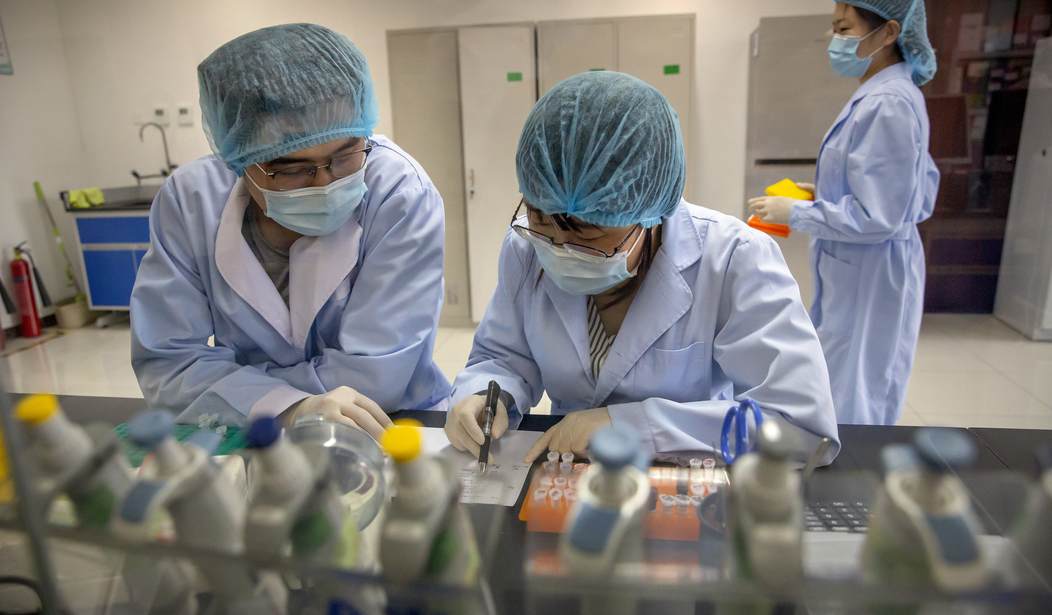Deaths from COVID-19 are dropping, but we probably can't resume normal life until someone develops a vaccine. Experts say it will take at least 12 to 18 months.
Why so long?
Because to make sure a vaccine works, researchers must recruit lots of volunteers and wait for them to get sick.
First, they inject the volunteers. Half get the test vaccine; half get a placebo. Then, the test subjects resume their normal lives, and researchers watch to see who gets sick.
For that research to work, there must be enough of the coronavirus around for enough volunteers to get the coronavirus.
But now COVID-19 cases are declining. Researchers worry that there won't be enough sick people to test it on.
Fortunately, there's a way to speed testing up, if regulators allow it. It's called a human challenge trial.
"'Challenge' means that you intentionally expose people to the coronavirus... 'challenging' them with the virus," explains Carson Poltorack in my new video.
Poltorack is a member of One Day Sooner, a group of mostly healthy young people who volunteered to be infected with the coronavirus. So far, 24,000 people from 100 countries have volunteered. They are willing to risk their lives if it means the world get a vaccine sooner.
"It's the right thing to do," says Poltorack.
The idea of a challenge trial is not new. Such trials were used to find treatments for malaria, typhoid, dengue fever and cholera. But there were treatments for those diseases. So far, we have no reliable treatment for COVID-19.
Recommended
"People your age do die from COVID," I say to Poltorack.
"Absolutely." He responds. "I'm 23. The risk of somebody from 18 to 30 is about 3 in 10,000, the same as if you were to donate a kidney."
Poltorack volunteered after reading a paper where bioethicist Nir Eyal argued that challenge trials would develop a vaccine sooner, without much added risk.
"We put people through risks in clinical trials all the time," says Eyal.
Young people are more likely to take such risks. Some volunteer to fight wars. Fighting this pandemic, say One Day Sooner volunteers, is like that.
One recorded a video where she says it is "maybe the most important thing I will ever do."
But some doctors say it shouldn't be done.
"We need to wait," says Dr. Jennifer Miller, bioethics professor at Yale Medical School.
She says a challenge trial may not save much time. "You have to develop the challenge virus strain... test it in animals... figure out the correct dose. That can take 6 to 18 months."
Maybe. Virologist Stanley Plotkin, developer of the rubella vaccine, says it could take just two months.
I argue that the length of time shouldn't matter. "If individuals want to experiment, shouldn't it be their choice?" I ask Miller. "Why doesn't the volunteer get to say, 'I'm an adult. It's my body, I get to make the decision!?'"
"We have moral limits to what you can do with your freedoms," replies Miller. "We mandate that you wear helmets when you ride bicycles in some states. We say you have to wear a seatbelt for your protection... I'm not sure the added risks to the participants are justified."
"That's a decision that each individual informed volunteer can make for themselves," says Poltorack, wisely.
I obviously agree. I asked Poltorack, "One month's difference in the development of a vaccine could save a thousand lives?"
"No, probably far more than that," he answers. "Probably in the range of tens to hundreds of thousands."
Some bureaucracies have come around to the idea. Recently, the World Health Organization released a paper on challenge trials. Thirty-five members of Congress wrote the FDA asking it to consider a challenge trial.
We adults should be allowed to make our own decisions about what we do with our own bodies.
If some people want to get infected, let them!
John Stossel is author of "Give Me a Break: How I Exposed Hucksters, Cheats, and Scam Artists and Became the Scourge of the Liberal Media." For other Creators Syndicate writers and cartoonists, visit www.creators.com.
























Join the conversation as a VIP Member